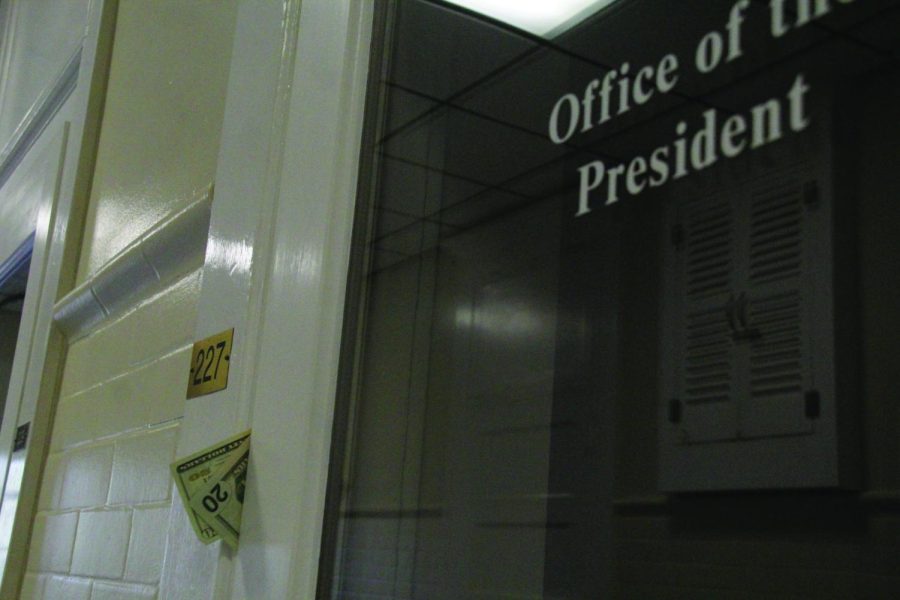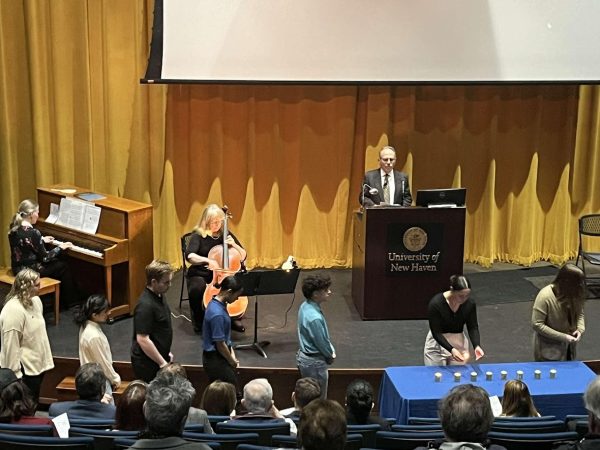University announces GSI increase in midst of inflated economy
Photo courtesy of Charger Bulletin/Charlotte Bassett
A $20 bill, wedged in the door of the Office of the President, West Haven, Sept. 24, 2022.
Earlier this month, Chancellor Steven Kaplan announced a 2% General Salary Increase (GSI) for much of the current faculty and staff.
Vice President of Finance and Administration George Synodi spoke further to clarify this financial decision.
He said that those eligible include “the non-union employees of the university” and described the number of groups within university faculty and staff which are parts of separate unions, including police staff and facilities employees. For workers who are unionized, salary increases are established through collective bargaining agreements.
Synodi said those who qualify are non-unionized employees who have been working for the university for an established period of time; new faculty and staff do not currently qualify.
Synodi further spoke on the process of implementing the GSI increase. He explained how the university operates on a fiscal calendar – running from July 1 to June 30, and hence annual budgets are set around this time.
He said “when we put our annual budget plan together, we included the 2% in the budget planning.” He also said that the university references records from the Bureau of Labor Statistics for the northeast region in order to determine the values set for such salary increases.
Inflation rates are “the highest that they’ve been in years” Synodi said, and as a result, they needed to assess their annual budget. Pre-pandemic, inflation rates within the region and across the country tended to stay closer to the 2-3% range, whereas now they have hit closer to 7-8%.
Synodi said that the university considers factors such as cost of living (COL) when determining changes in worker salary. He also emphasized the value of supporting workers through such economic factors in light of valuing the retention of “good employees.”
When considering future GSI increases and other responses regarding salary needs, Synodi said that “in order to remain competitive we’re going to need to consider that.”
In a different light, Synodi said that the GSI increase did not pull funding from any other areas of the university’s budget. Surrounding concerns about a rise in tuition, he said “absolutely not in the current year” as “there is no budgetary impact” to this motion.
He said that the salary increase was a response to the current economic climate, and that while other universities are actually awarding greater increases, the University of New Haven is currently “just not in a position to do that.”
Sydoni voiced his hopes that the rates of inflation will slow down, but in the meantime budgets would reflect COL needs at this time. This mirrored Kaplan’s response, who in his official notice said “While we must remain highly strategic and fiscally prudent in the current higher education landscape, investing in and nurturing our people must remain a top priority.”

Mia Adduci is a senior studying communication concentrating in multi-platform journalism and media who began writing for the paper her first semester on...










